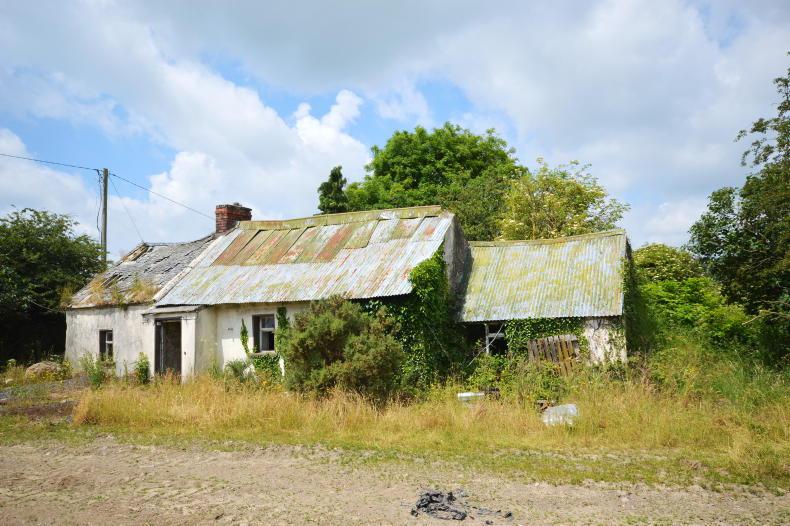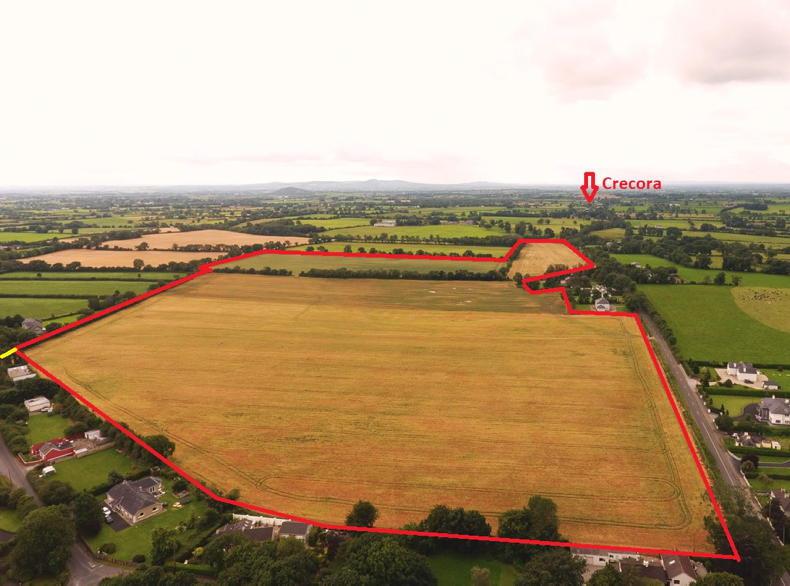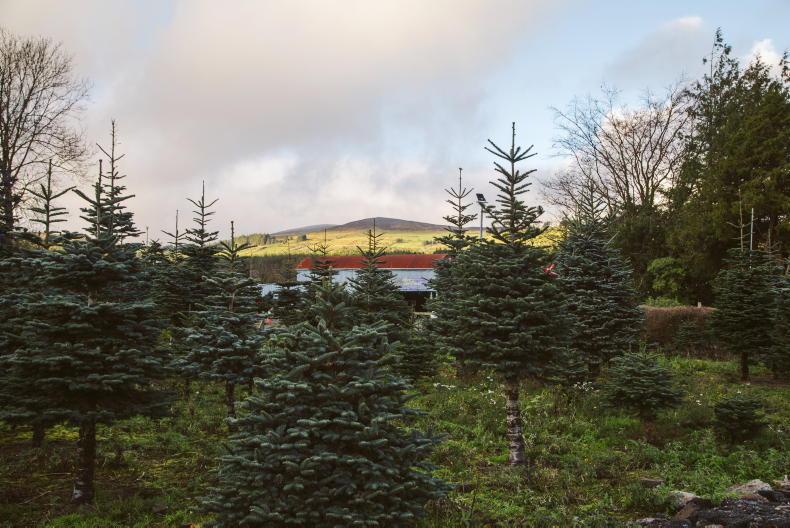Farmers require valuations for many different reasons. The two most frequent ones are the transfer of a farm and issuing of probate following the passing of a landowner.
Valuations can also be required where a mortgage or other loan is being sought. Generally those valuations must be carried out by a member of the bank’s panel of approved valuers.
Farmers may also seek a valuation where there is a private sale of land, often between family members but also between unrelated parties, eg neighbours.
Valuations are usually required in the case of marital separations. Where a farmer transfers the enterprises into a company for tax efficiency, again the value of transferred assets need to be valued.
So, doing valuations is a big part of the work of auctioneers and it goes on all year round.
Some auctioneers experienced an increase in requests for valuations when the COVID-19 pandemic arrived.
“Farmers and families had more time on their hands to think about matters such as transfer and succession,” said auctioneer Gordon Cobbe of GVM Property Sales in Tullamore. The group has offices in Limerick and Offaly.

Gordon Cobbe, auctioneer, GVM Auctioneers, Tullamore.
“There has been a degree of worry about the future. It brought matters to a head.”
I would recommend that people start the process from the age of 30 onwards and consult an accountant to put a succession plan in place
He also said: “Many people leave matters such as land transfer on the long finger. We do have people coming in here who are coming up to age 40 and so are close to the cut off point for qualifying as a young farmer. I would recommend that people start the process from the age of 30 onwards and consult an accountant to put a succession plan in place so that a transfer can be made as tax efficiently as possible.
“Frequently a farmer will come to me and say, ‘I’m thinking of transferring the farm – what do I do?’ The first thing I advise is go home and talk to the family. Make sure everything is agreed and happy. Coming back and making changes later prolongs the whole process.
“For the process of completing a valuation the farmer needs to talk to a solicitor and accountant. The solicitor will provide us with a set of folio maps and the accountant needs to provide a full list of what valuations are needed.
We need to do it all in one day rather than having to come back out to the farm again, doing it bit by bit
“There could be valuations of land, livestock, houses, machinery and entitlements involved. We need to do it all in one day rather than having to come back out to the farm again, doing it bit by bit.”
Possible issues around lifetime interests in the farm home can factored into any transfer and need to be discussed with the solicitor and informed to the valuer.
Range of factors
The assets to be looked at in a farm valuation vary considerably. There could be just a 20ac roadside field. But it could be a 160ac farm with over 100 cattle, two houses and 25 pieces of machinery. A valuer will assess all aspects of a property and use them to come to a valuation. Below are the main factors to be looked at.
The quality of the land can effect a valuation of a farm by a few thousand euros per acre. An auctioneer with local knowledge can quickly assess the quality and the value of fields. They know what land in an area is like and how much it has fetched at sales.
Small parcels tend to be given a higher valuation per acre than bigger blocks of land. This reflects what usually happens at a sale. Relatively fewer people have access to enough funds to buy a large farm while the smaller holding is within reach of more potential buyers.

In August, Quinn Property sold this derelict house on 7ac at Askinamoe, Ferns for €170,000. Auctioneers in many parts of the country have upped the valuation given to derelict houses.
As general house prices rise and fall, so too does the value of a house on a farm. “We have had to lift up the value put on a farm residence in the past two years,” said David Quinn of Quinn Property, based in Gorey, Co Wexford, and with a number of other offices. His firm does a lot of valuations in Wexford and surrounding counties.

David Quinn auctioneer Quinn Property Co Wexford.
“In 2010 and 2012, when only farmers were buying farms, the value on a house fell. Now it has increased,” he explained.
A key issue is where a house is sited on a farm, he said. That is because a house on edge of the land, near the public road, can be sold off separately at any point, adding to its value. That is not the case with a house in the middle of a farmyard in the middle of the farmland.
“If it can’t be split off the land the value given to the house is typically only 50% of what would be given if the house was at the side of the road,” David said.
Values given to derelict houses have also shot up in the past few years, he said. This is partly because of the rise in general house prices. But it’s also because of the mounting difficulties in getting planning permission to build a house in a rural area. “Values given to a derelict house have doubled in the past three or four years,” David Quinn said. “The house that was given a value of €40,000 to €60,000 is now valued at close to €100,000.”
A derelict house can be done up or – if planning permission is obtained – a new house built in its place. “A key issue is whether there is a septic tank,” David Quinn said. “If there is, or if there’s a water connection, you have a much better chance of getting planning. But where a derelict house has no septic tank, a county council may view this as a green field site. This is very important in some counties including Wicklow, Kildare and Meath.”
Location is one of the big influences. Some counties eg, those in Leinster and near Dublin consistently have higher average prices.
But more local factors are also influential. A field located in an intense farming area, or surrounded by farmers looking to expand, will be given a higher value than the same land elsewhere. Farmers looking to expand can add €2,000/ac or €3,000/ac to the value of land in an area, David Quinn said.
Proximity to amenities can boost valuation. A non-farmer buyer will often be prepared to pay more for land located close to a beach.
Land located within a 5km or 10km of a busy town or city will tend to be given a higher value. There are more customers for such land if put up for sale.

There are benefits if a farmhouse has a roadside siting. GVM Auctioneers sold this 79ac tillage farm at Crecora, Co Limerick for €1.42m or €18,000/ac in October, at auction.
Road frontage is still important and can increase the value of a farm. Land with frontage has “hope value” for possibly obtaining planning permission for a house.
The nature of a road beside a farm will be looked at in a valuation. Access onto a straight, wide road with an 80km/h speed limit tends to add value. Access on to a busy regional road, including those with a 100km/h speed limit, can cause difficulties for farm work.
The value given to entitlements is well known and consistent and depends mainly on their face value. “When looking at entitlements in a valuation we use the figures that entitlements traded for in the current year,” Gordon Cobbe said. “We use the evidence that we can see.”
Entitlements with relatively low face value traded this year at two times face value but down to 1.5 times face value for the very lowest, eg under €80. Entitlements with more average face value traded at 2.5 times face value and highest entitlements made about 2.8 and 2.9 times face value.
“The value of entitlements hasn’t changed much in the past few years,” David Quinn said, “and I don’t see much change in 2022. However, any proposal for changes to clawback rules, which the Department of Agriculture is considering, could see more entitlements come on the market and that could change values.”
Sheds typically do not add greatly to the value of a farm. That is particularly the case with older sheds, eg round-roofed sheds built 60 and 70 years ago. Likewise, traditional outbuildings with stone walls usually add little in a valuation.
Even more modern sheds may not add as much as their building cost. This may change given the current inflation in the cost of building materials.
The valuation of livestock is generally straightforward, given that full market values are readily available. All cattle will be looked at and often photographed. For a big herd, they may be valued in batches of similar age, weight, breed, etc. For example, if there were 10 Charolais heifers of 500kg each they might be worth from €1,200 to €1,250 and would average €1,225 in value.
Auctioneers such as Gordon Cobbe and David Quinn sell cattle every week in their respective marts and so are up to date with prices. However, if there are valuable pedigree animals involved, advice from a specialist valuer may be sought.
Valuing machinery can also be sometimes required. General farm machinery is relatively straightforward to value, like tractors, slurry tankers, balers etc. “However, you can come across machinery used in vegetable growing or contracting and specialist knowledge would be required for these,” Gordon Cobbe said. “There could be just two or three of these machines in the whole country. But we have held machinery auctions so we generally have a fair idea what we’re looking at.”
Having an electricity connection and a reliable water supply will add to the value of land. A new electrical connection can be costly.
An existing connection to the water mains is best but a good well is of value too.
“However, having a river alongside land – as long as it doesn’t flood on to the land or go dry in a drought – may make that land of interest to vegetable growers or other intensive crop farmers who need irrigation,” Gordon Cobbe said.
Having plenty of mature trees and large hedging on a farm may or may not add to value. They are not suited to tillage farming or intensive dairy farming. But they can suit cattle and sheep farming.
Designations such as SAC and Hen Harrier tend to have a negative effect on land value. But such land is often of marginal quality anyway. Designation brings rules and restrictions on what farming activities can be carried out. In many areas, the value of designated land is in the region of €2,000/ac to €4,000/ac.

Land under forestry might add value to a property depending on the type, age and condition of the trees. \ Claire Nash
The value put on forestry land will depend on the quality of the land and the type, age and condition of the trees.
In the 1980s and 1990s planting was carried out on some land now clearly recognised as not suitable. The forestry on this land will not yield as well as originally hoped and this land is of lower value as a result.
Thriving Sitka spruce plantations tend to be the most highly valued. The tree matures at 35 to 40 years and yields valuable timber. Investment funds and pension companies are willing to buy these plantations at 20 years – when the landowner has claimed all premia – and wait until the plantation is mature. Norway Spruce plantations tend to be next most highly valued.

Sitka spruce at 20 to 25 years is fetching €4,000/ac to €6,000/ac. Sitka spruce at maturity is fetching €10,000/ac to €15,000/ac depending on size, yield, access and other factors.
Young broadleaved plantations tend not to be as highly valued because of the length of time to maturity and final harvest. The value of land planted with ash has been hit severely by ash dieback disease.
The size of a forestry plantation also influences valuation. Larger blocks, eg 25ac and above, are more attractive to commercial buyers including forestry companies. Good access for big forestry machinery and trucks will help in a valuation.
The cost of a valuation starts at €200 to €300+ 23% VAT for a straightforward block of land and will exceed €1,000+ VAT for a more complex property which includes land, house, sheds, machinery and livestock. Valuations for lending purposes are more detailed and must adhere to specific formats and typically cost about €1,000+ VAT.
Getting a valuation done typically takes one to two weeks but longer for a complex holding where land, a house, livestock and machinery are involved.
Farmers require valuations for many different reasons. The two most frequent ones are the transfer of a farm and issuing of probate following the passing of a landowner.
Valuations can also be required where a mortgage or other loan is being sought. Generally those valuations must be carried out by a member of the bank’s panel of approved valuers.
Farmers may also seek a valuation where there is a private sale of land, often between family members but also between unrelated parties, eg neighbours.
Valuations are usually required in the case of marital separations. Where a farmer transfers the enterprises into a company for tax efficiency, again the value of transferred assets need to be valued.
So, doing valuations is a big part of the work of auctioneers and it goes on all year round.
Some auctioneers experienced an increase in requests for valuations when the COVID-19 pandemic arrived.
“Farmers and families had more time on their hands to think about matters such as transfer and succession,” said auctioneer Gordon Cobbe of GVM Property Sales in Tullamore. The group has offices in Limerick and Offaly.

Gordon Cobbe, auctioneer, GVM Auctioneers, Tullamore.
“There has been a degree of worry about the future. It brought matters to a head.”
I would recommend that people start the process from the age of 30 onwards and consult an accountant to put a succession plan in place
He also said: “Many people leave matters such as land transfer on the long finger. We do have people coming in here who are coming up to age 40 and so are close to the cut off point for qualifying as a young farmer. I would recommend that people start the process from the age of 30 onwards and consult an accountant to put a succession plan in place so that a transfer can be made as tax efficiently as possible.
“Frequently a farmer will come to me and say, ‘I’m thinking of transferring the farm – what do I do?’ The first thing I advise is go home and talk to the family. Make sure everything is agreed and happy. Coming back and making changes later prolongs the whole process.
“For the process of completing a valuation the farmer needs to talk to a solicitor and accountant. The solicitor will provide us with a set of folio maps and the accountant needs to provide a full list of what valuations are needed.
We need to do it all in one day rather than having to come back out to the farm again, doing it bit by bit
“There could be valuations of land, livestock, houses, machinery and entitlements involved. We need to do it all in one day rather than having to come back out to the farm again, doing it bit by bit.”
Possible issues around lifetime interests in the farm home can factored into any transfer and need to be discussed with the solicitor and informed to the valuer.
Range of factors
The assets to be looked at in a farm valuation vary considerably. There could be just a 20ac roadside field. But it could be a 160ac farm with over 100 cattle, two houses and 25 pieces of machinery. A valuer will assess all aspects of a property and use them to come to a valuation. Below are the main factors to be looked at.
The quality of the land can effect a valuation of a farm by a few thousand euros per acre. An auctioneer with local knowledge can quickly assess the quality and the value of fields. They know what land in an area is like and how much it has fetched at sales.
Small parcels tend to be given a higher valuation per acre than bigger blocks of land. This reflects what usually happens at a sale. Relatively fewer people have access to enough funds to buy a large farm while the smaller holding is within reach of more potential buyers.

In August, Quinn Property sold this derelict house on 7ac at Askinamoe, Ferns for €170,000. Auctioneers in many parts of the country have upped the valuation given to derelict houses.
As general house prices rise and fall, so too does the value of a house on a farm. “We have had to lift up the value put on a farm residence in the past two years,” said David Quinn of Quinn Property, based in Gorey, Co Wexford, and with a number of other offices. His firm does a lot of valuations in Wexford and surrounding counties.

David Quinn auctioneer Quinn Property Co Wexford.
“In 2010 and 2012, when only farmers were buying farms, the value on a house fell. Now it has increased,” he explained.
A key issue is where a house is sited on a farm, he said. That is because a house on edge of the land, near the public road, can be sold off separately at any point, adding to its value. That is not the case with a house in the middle of a farmyard in the middle of the farmland.
“If it can’t be split off the land the value given to the house is typically only 50% of what would be given if the house was at the side of the road,” David said.
Values given to derelict houses have also shot up in the past few years, he said. This is partly because of the rise in general house prices. But it’s also because of the mounting difficulties in getting planning permission to build a house in a rural area. “Values given to a derelict house have doubled in the past three or four years,” David Quinn said. “The house that was given a value of €40,000 to €60,000 is now valued at close to €100,000.”
A derelict house can be done up or – if planning permission is obtained – a new house built in its place. “A key issue is whether there is a septic tank,” David Quinn said. “If there is, or if there’s a water connection, you have a much better chance of getting planning. But where a derelict house has no septic tank, a county council may view this as a green field site. This is very important in some counties including Wicklow, Kildare and Meath.”
Location is one of the big influences. Some counties eg, those in Leinster and near Dublin consistently have higher average prices.
But more local factors are also influential. A field located in an intense farming area, or surrounded by farmers looking to expand, will be given a higher value than the same land elsewhere. Farmers looking to expand can add €2,000/ac or €3,000/ac to the value of land in an area, David Quinn said.
Proximity to amenities can boost valuation. A non-farmer buyer will often be prepared to pay more for land located close to a beach.
Land located within a 5km or 10km of a busy town or city will tend to be given a higher value. There are more customers for such land if put up for sale.

There are benefits if a farmhouse has a roadside siting. GVM Auctioneers sold this 79ac tillage farm at Crecora, Co Limerick for €1.42m or €18,000/ac in October, at auction.
Road frontage is still important and can increase the value of a farm. Land with frontage has “hope value” for possibly obtaining planning permission for a house.
The nature of a road beside a farm will be looked at in a valuation. Access onto a straight, wide road with an 80km/h speed limit tends to add value. Access on to a busy regional road, including those with a 100km/h speed limit, can cause difficulties for farm work.
The value given to entitlements is well known and consistent and depends mainly on their face value. “When looking at entitlements in a valuation we use the figures that entitlements traded for in the current year,” Gordon Cobbe said. “We use the evidence that we can see.”
Entitlements with relatively low face value traded this year at two times face value but down to 1.5 times face value for the very lowest, eg under €80. Entitlements with more average face value traded at 2.5 times face value and highest entitlements made about 2.8 and 2.9 times face value.
“The value of entitlements hasn’t changed much in the past few years,” David Quinn said, “and I don’t see much change in 2022. However, any proposal for changes to clawback rules, which the Department of Agriculture is considering, could see more entitlements come on the market and that could change values.”
Sheds typically do not add greatly to the value of a farm. That is particularly the case with older sheds, eg round-roofed sheds built 60 and 70 years ago. Likewise, traditional outbuildings with stone walls usually add little in a valuation.
Even more modern sheds may not add as much as their building cost. This may change given the current inflation in the cost of building materials.
The valuation of livestock is generally straightforward, given that full market values are readily available. All cattle will be looked at and often photographed. For a big herd, they may be valued in batches of similar age, weight, breed, etc. For example, if there were 10 Charolais heifers of 500kg each they might be worth from €1,200 to €1,250 and would average €1,225 in value.
Auctioneers such as Gordon Cobbe and David Quinn sell cattle every week in their respective marts and so are up to date with prices. However, if there are valuable pedigree animals involved, advice from a specialist valuer may be sought.
Valuing machinery can also be sometimes required. General farm machinery is relatively straightforward to value, like tractors, slurry tankers, balers etc. “However, you can come across machinery used in vegetable growing or contracting and specialist knowledge would be required for these,” Gordon Cobbe said. “There could be just two or three of these machines in the whole country. But we have held machinery auctions so we generally have a fair idea what we’re looking at.”
Having an electricity connection and a reliable water supply will add to the value of land. A new electrical connection can be costly.
An existing connection to the water mains is best but a good well is of value too.
“However, having a river alongside land – as long as it doesn’t flood on to the land or go dry in a drought – may make that land of interest to vegetable growers or other intensive crop farmers who need irrigation,” Gordon Cobbe said.
Having plenty of mature trees and large hedging on a farm may or may not add to value. They are not suited to tillage farming or intensive dairy farming. But they can suit cattle and sheep farming.
Designations such as SAC and Hen Harrier tend to have a negative effect on land value. But such land is often of marginal quality anyway. Designation brings rules and restrictions on what farming activities can be carried out. In many areas, the value of designated land is in the region of €2,000/ac to €4,000/ac.

Land under forestry might add value to a property depending on the type, age and condition of the trees. \ Claire Nash
The value put on forestry land will depend on the quality of the land and the type, age and condition of the trees.
In the 1980s and 1990s planting was carried out on some land now clearly recognised as not suitable. The forestry on this land will not yield as well as originally hoped and this land is of lower value as a result.
Thriving Sitka spruce plantations tend to be the most highly valued. The tree matures at 35 to 40 years and yields valuable timber. Investment funds and pension companies are willing to buy these plantations at 20 years – when the landowner has claimed all premia – and wait until the plantation is mature. Norway Spruce plantations tend to be next most highly valued.

Sitka spruce at 20 to 25 years is fetching €4,000/ac to €6,000/ac. Sitka spruce at maturity is fetching €10,000/ac to €15,000/ac depending on size, yield, access and other factors.
Young broadleaved plantations tend not to be as highly valued because of the length of time to maturity and final harvest. The value of land planted with ash has been hit severely by ash dieback disease.
The size of a forestry plantation also influences valuation. Larger blocks, eg 25ac and above, are more attractive to commercial buyers including forestry companies. Good access for big forestry machinery and trucks will help in a valuation.
The cost of a valuation starts at €200 to €300+ 23% VAT for a straightforward block of land and will exceed €1,000+ VAT for a more complex property which includes land, house, sheds, machinery and livestock. Valuations for lending purposes are more detailed and must adhere to specific formats and typically cost about €1,000+ VAT.
Getting a valuation done typically takes one to two weeks but longer for a complex holding where land, a house, livestock and machinery are involved.












 This is a subscriber-only article
This is a subscriber-only article










SHARING OPTIONS: